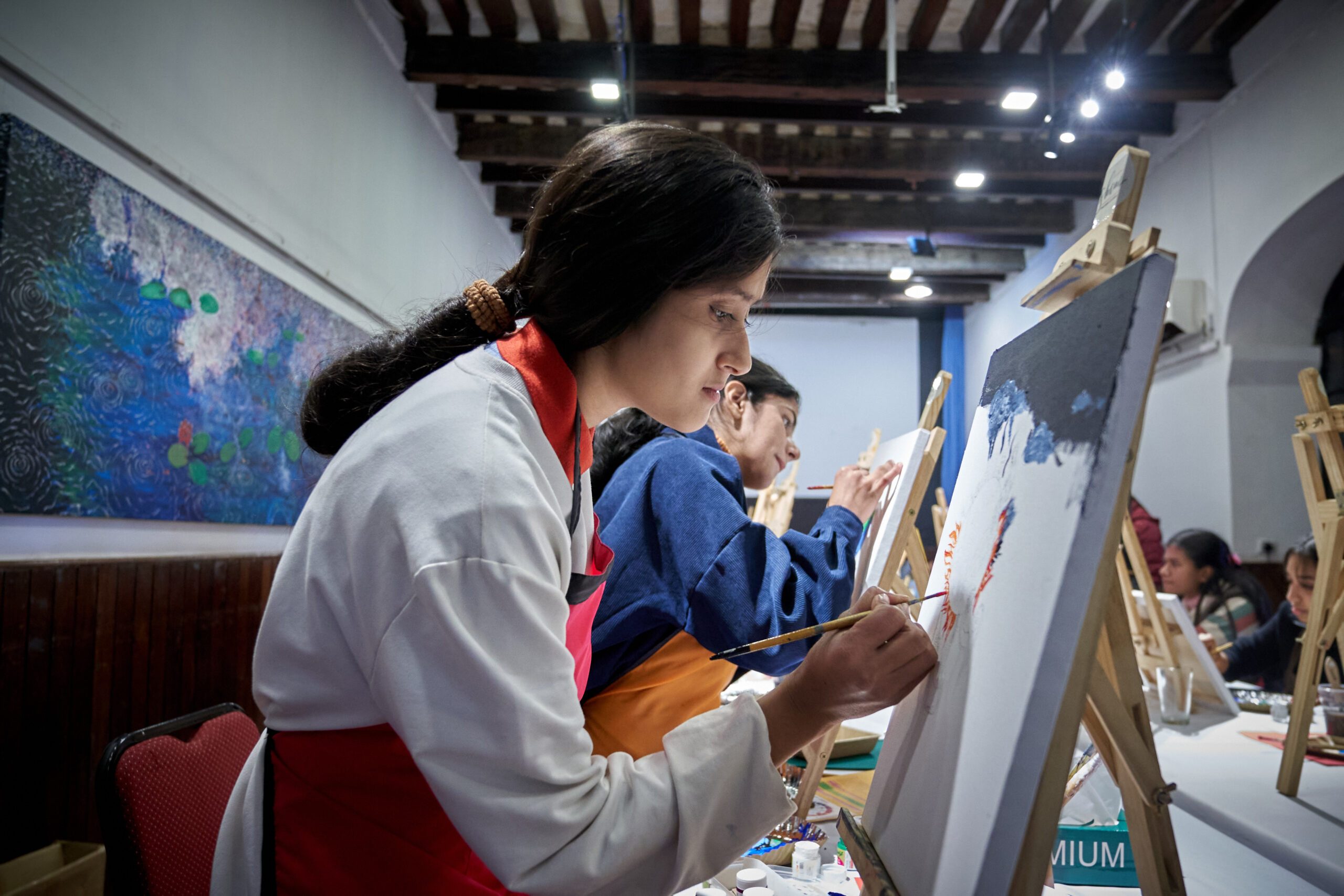Babita uses art to fight climate change
The World Economic Forum estimates it will take 131 years to reach gender equality, that's why young girls like Babita from eastern Nepal use artivism to advocate for girls' education amidst the harsh realities of climate change. She has spoken out about the impact of climate change on girls' education and is using her art to influence the local government to take action. Together, we can beat the clock.

“I did not realise the impact of climate change on our lives until I became part of the advocates for climate change initiative. Hotter temperatures, more frequent storms, changes in rainfall patterns and rising sea levels are due to climate change,” says Babita.
“Hotter temperatures, more frequent storms, changes in rainfall patterns and rising sea levels are due to climate change.”
Babita
“My family depends on agriculture. In my childhood, the monsoon came on time. The crops grew on time. But later I remembered that my family had to wait for the rain. If there is no rain, we have to buy water for irrigation.”
Babita uses her art skills to campaign on various issues related to girls’ rights. “My activism is mostly for achieving gender equality. I am more focused on ending child marriage in my village.”
“Later, I have been campaigning against the harsh realities of climate change’s impact on girls’ education. The extreme weather events have made it difficult for students to attend their regular classes either in summer or in winter.”
“The roof of my school is made of tin and is not very good. When summer comes, it gets very hot inside and many of us get sick because of the heat. Sometimes the school has to be closed for a long time and we can’t finish our lessons properly.”
Babita’s village is prone to landslides, heavy rains and flash floods. The roads are often blocked, so students are unable to attend school for a few days every year until the debris is cleared away.
“My request to the government is to ask all schools to improve the school infrastructure, such as proper ventilation, fans, air conditioners or coolers, and limit the number of students to 20 in each class. The school should also allocate a budget for disaster preparedness.”
Campaigning against climate change
Babita became part of Plan International’s sponsorship programme when she was 8 years old. In 2020, she enrolled as a member of the Girls Out Loud programme, which provides her with a safe online space to freely share her artwork, which is often inspired by child marriage, gender-based violence and menstrual health, in a dedicated Facebook group moderated by Plan International.
“By frequently sharing updates about my campaign in my community and posting my art on the Girls Out Loud group, I was announced as the loudest girl of the month in February 2023,” shares Babita.
“By frequently sharing updates about my campaign in my community and posting my art on the Girls Out Loud group, I was announced as the loudest girl of the month in February 2023.”
Babita
“This motivated me to take part in various discussions related to girls’ rights. As part of the Girls Out Loud programme, I attended a workshop on climate change advocacy. It helped me to campaign against climate change and its impact on girls’ education.”
Following the workshop, Babita organised an awareness raising programme on climate change and its impact on girls’ education at her school. “My teachers supported me in organising the session and teaching the other students about climate change. More than 50 students attended the session and appreciated my efforts to provide them with information about the climate crisis”.
Babita’s journey to become a climate change advocate began then. She started raising the issue of climate crisis in her adolescent girls’ club. Through her girls’ club, she also took part in local-level climate change initiatives and conducted a door-to-door campaign to raise awareness.
“I became even more determined when I worked as a youth activist on ‘For Our Futures’ research, where I was part of 30 other activists from Nepal, Indonesia and Australia.”
“Attending a series of youth workshops in 2023 increased my knowledge on climate change, and I was inspired by my fellow activists on how they organised campaigns in their own environments,” says Babita.
“I may be young, but my voice carries the dreams of generations. I am determined to influence local policies for climate action to ensure a sustainable future for us all.”
“I may be young, but my voice carries the dreams of generations. I am determined to influence local policies for climate action to ensure a sustainable future for us all.”
Babita
How we are supporting girls
Since 2021, Plan International has been working with youth-led organisations through its Youth Hub initiatives. These organisations develop creative ideas and strategies to engage young people in our communities, raise awareness of issues such as climate change and empower them to become change agents who can influence local government decisions.
In the For Our Futures project, 30 youth activists from Indonesia, Nepal and Australia worked together to find out how climate change is affecting girls’ education as they see it, and what they would like to see changed as a result.
Through an online survey and photos, the youth activists collected stories of girls’ experiences of how climate change affects their education and developed their vision for a better future. The youth activists used a climate justice lens to develop these recommendations, looking at how the climate crisis is hitting the people who have contributed the least to the problem the hardest, and how our recommended solutions can redress this injustice.


